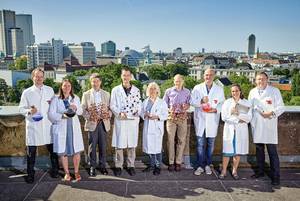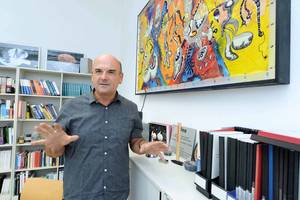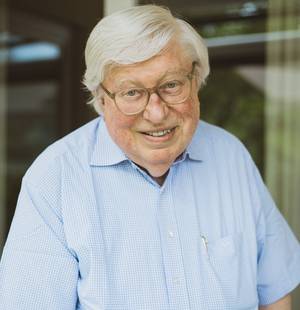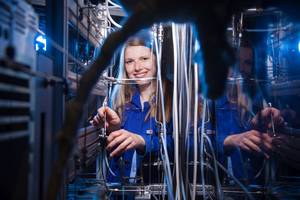10th Anniversary of UniCat: Symposium on "Unifying Concepts in Catalysis: Status Quo and Challenges."
07 July 2017
With a total sum of about fifty million euros, the German Research Foundation (DFG) sponsored the Cluster of Excellence, UniCat, and its graduate school, the BIG-NSE. The 10th anniversary of their existence at the TU Berlin will be celebrated from July 12th – 14th.
The ten-year jubilee will kick-off with an international high-caliber scientific symposium, "Unifying Concepts in Catalysis: Status Quo and Challenges." Scientists from Germany and abroad will discuss the latest achievements and challenges on the road to unifying chemical and biological catalysis.
In addition to the plenary lectures, the program will include poster presentations and knowledge sharing by BIG-NSE scholarship recipients.
The event will be opened on Wednesday, July 12, 2017, by the Berlin State Secretary for Science and Research, Steffen Krach, and the President of the TU Berlin, Professor Dr. Christian Thomsen.
“One of UniCat’s greatest successes is, undoubtedly, overcoming the boundaries between the different disciplines of chemistry, physics, and biology,” of this, Professor Dr. Matthias Drieß, spokesman for the Cluster of Excellence, Unifying Concepts in Catalysis (UniCat), and professor at the TU Berlin, is convinced. UniCat is the only German Cluster of Excellence that works, through an exceptionally broad range of disciplines, with the economically extremely important topic of catalysis.
“A catalyst plays a role in the production of 90% of all of the products which we hold in our hands on a daily basis. Today, we are still wasting far too many resources on this. Sustainable production methods require better and more efficient catalysts. Increasing the efficiency of a catalyst by a single decimal point could potentially leverage an enormous amount of energy savings and resource conservation,” said Prof. Drieß, explaining the significance of catalysis research on sustainable production.
Over the past ten years, UniCat has already achieved several internationally recognized breakthroughs in catalysis research. The 250 scientists from 28 countries have, among other things, advanced the oxidative coupling of methane and investigated biocatalysts to use solar energy for energy generation. For this, they analyzed the enzymes of microorganisms and thereby gained knowledge about the efficient activation of smaller molecules like carbon dioxide, carbon monoxide or hydrogen – reactions that are becoming increasingly important for use in the chemical industry. Last, but not least, 1,700 publications in renowned journals underscore the scientific success of the cluster.
The chemical industry has also not overlooked UniCat’s successful fundamental research. Since 2014 some seven postdocs and ten PhD students have been conducting their research at the BasCat, BASF’s and UniCat’s so-called Joint Lab at the TU Berlin. The goal here is to establish an interface between fundamental research and application-oriented research, so that more innovative research results can result in applications more quickly. BasCat researches the selective activation of hydrocarbons, which are constituents of fossil raw materials.
To develop Berlin as a center for green and sustainable chemistry start-ups is another goal of UniCat. In 2017, the Inkulab, financed by the Berlin economy, opened its gates: a laboratory container-system on the grounds of the TU Berlin, fully equipped with ventilation technology, laboratory and safety equipment. Inkulab provides free laboratory workstations for green chemistry, life sciences or nanotechnology founders. A large start-up center, a Chemical Invention Factory (CIF), for which the Berlin Senate has already committed seven million euros, is to follow.
“In the past ten years we have learned a lot about individual catalysis processes,” said Prof. Drieß. “The task now is to efficiently and dynamically combine these processes in order to ensure sustainable and resource-saving production in the future. This requires a true paradigm shift, and our proposal for the excellence strategy as "UniSysCat" also follows this direction. I look forward with confidence."
Attendance at the symposium "Unifying Concepts in Catalysis: Status Quo and Challenges," or its individual components is open to the public and free of charge. Registration is requested.
Registration and program is available at: www3.unicat.tu-berlin.de/10years
For further information please contact
Dr. Martin Penno
UniCat Cluster of Excellence, Public Relations
phone: +49 30 314-28 592
E-Mail: martin.penno@tu-berlin.de
www3.unicat.tu-berlin.de
Service for journalists
All TU Berlin press releases Join our press list Events Research topics |
TU Berlin on Facebook TU Berlin on Twitter TU Berlin on YouTube |




